
Obstetrics and gynaecology (OBGYN) are two medical subspecialties under one branch of medicine. Both an obstetrician and a gynaecologist play a vital role in the overall healthcare of women.


Obstetrics refers to the specialty that involves care during pregnancy, childbirth, and after delivery. An obstetrician provides medical care for mother and foetus’ health during antenatal (pregnancy), intrapartum (childbirth or delivery), and postpartum (six weeks after birth) periods.
Gynaecology refers to the specialty that treats medical conditions that affect the female reproductive system - cervix, uterus, ovaries, fallopian tubes, and vagina. A gynaecologist’s focus is on the non-pregnancy aspects of a woman’s reproductive health.
The journey of pregnancy and childbirth is an exciting and life-changing experience. At Pantai Hospitals, we understand just how special this time is for both mother and baby. We place emphasis on patient care as well as ensuring mothers-to-be get optimal care during their pregnancy and memorable birthing experiences.
Maternity Services at Pantai Hospitals offer a full range of care throughout pregnancy, labour, birth, and postnatal period with the highest standards of safety and quality; personalised, support services for all pregnancies, with an ideal combination of medical expertise and advanced technology.
Being aware of the ways that your growing baby is affecting your body will help you to better prepare yourself for those changes as they happen. It is also helpful to be aware of the specific risk factor and associated medical tests for each of the three trimesters.
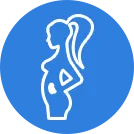
Find out what to expect in the first trimester of your pregnancy journey.
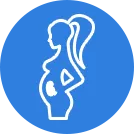
Glucose screening test: This test checks for gestational diabetes, a temporary condition which can develop during pregnancy.
Find out what to expect in the second trimester of your pregnancy journey.
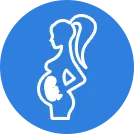
Find out what to expect in the third trimester of your pregnancy journey.

Ultrasound for foetal nuchal translucency (NT)
This test measures the area at the back of the foetus’ neck for thickening or extra fluid. Area that is thicker than normal may indicate Down syndrome, heart problems or trisomy 18. However, this is not a routine test, and it is usually conducted by a maternal-foetal medicine specialist.
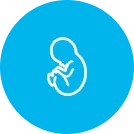
Second trimester detailed scan
This routine scan is performed within week 20 – 24 of the second trimester. Also known as foetal anomaly scan, it is primarily conducted to assess the foetus’ anatomy and detect structural abnormalities of the foetus.
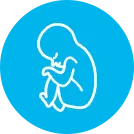
The third trimester is an exciting time - your baby is almost here! Your doctor might check your baby’s presentation to ensure that it is head-first before labour.
If your baby is breech (feet-first or rump-first), your doctor may physically manipulate your baby to the correct position by applying pressure on your abdomen. This is usually performed with ultrasound guidance. A caesarean section delivery is another option for breech babies.
Complicated pregnancy-related conditions include:


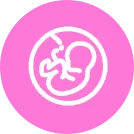

If your pregnancy is considered high risk , your doctor may refer you to a maternal-foetal medicine specialist, who is an obstetrician with special training in high-risk pregnancy care.
You can stop taking birth control when you are ready to get pregnant. However, the time it takes to conceive may vary from person to person. Speak to your doctor for guidance.


